Coastal Karnataka witnessed an eventful year in 2012. While the region could not get enough basking over some great achievements, it also had to bow in shame due to some incidents. A mixture of good, bad and ugly, here is the retro of the year 2012.
National Youth Festival
2012 took off with a colourful start as Mangalore was host to the 17th National Youth Festival of the country organized by the Government of India. The event which took place in January after months of preparation was a huge success. Students and youth participated from different parts of the country. The colourful youth festival was held in the presence of Ajay Maken, the then Union Minister of Youth Affairs and Sports with several star performers entertaining the crowd in Mangalore.
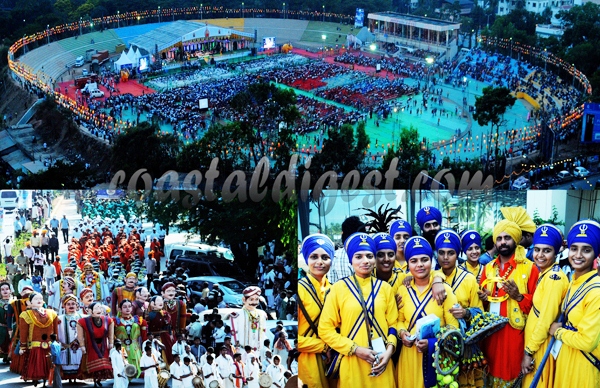
Dr. V S Acharya passes away
Dr V S Acharya, State Higher Education Minister passed away on February 14 after he suffered a massive heart attack and fell unconscious while attending a programme. He was 71.Leaders across parties expressed shock and grief over the death of the veteran political figure including SM Krishna, LK Advani and Nitin Gadkari. Dr. Acharya had served as the State Home Minister earlier as well.
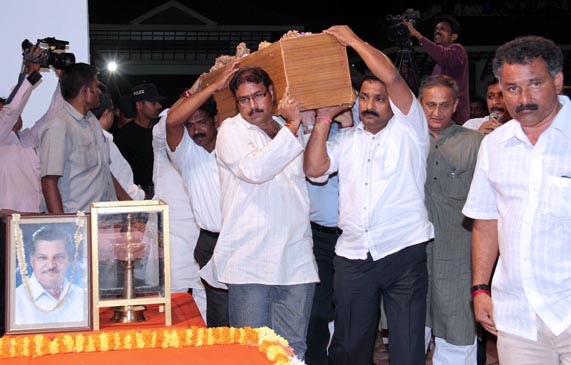
‘Porngate’: Palemar, 2 others resign
The month of February was witness to yet another sensational development which had an impact in Dakshina Kannada as well as the state per se. Three ministers in the state cabinet – DK’s own Krishna Palemar, LaxmanSavadi and C C Patil hit the hadlines for watching blue film on the floor of the house in the State Assembly. All three of them submitted their resignations following the incident.

Vittala Malekudiya put behind bars
On March 3, Vittala Malekudiya, a tribal boy pursuing his post-graduation in Journalism at Mangalore University was arrested by the Anti Naxal Force (ANF) along with his father Linganna for alleged naxal links. The arrest gives way to uproar questioning the ANF’s logic of putting the Malekudiyas behind bars without any substantial evidence. The father-son duo is released four months later. Vittala Malekudiya, meanwhile is made to write his examinations with handcuffs which also sparked outrage.
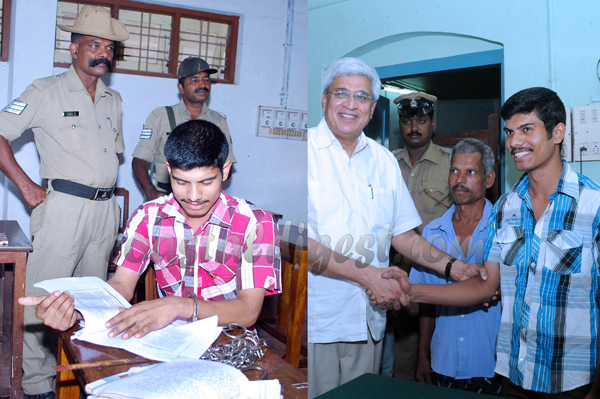
Mamata Poojary’s Team India wins Kabaddi World Cup
The Indian female Kabaddi team won the World Cup for the first time under the captainship of Mamatha Poojary, the local girl hailing from Hermunde village in Udupi district. The feat was achieved after India defeated Iran 25-19 in a pulsating final held at Patna. Mamatha was also a member of the gold winning team at the last Asian Games.

Gulzar Banu becomes Mayor
In a one of a kind political drama, Congress corporator Gulzar Banu was elected as the new Mayor of BJP dominated Mangalore City Corporation on March 7. The unexpected development took place when the nomination papers filed by BJP candidate Roopa D Bangera were rejected by the returning officer. The nomination of Ms. Bangera was rejected as she had failed to submit her caste certificate, which is a requirement to verify her eligibility criteria, on time. As Congress nominee Gulzar Banu was the only remaining candidate in the in the fray, she was declared elected unopposed. BJP’s Amitha Kala won the Deputy Mayor’s berth defeating Appi of Congress with a margin of 14 votes.
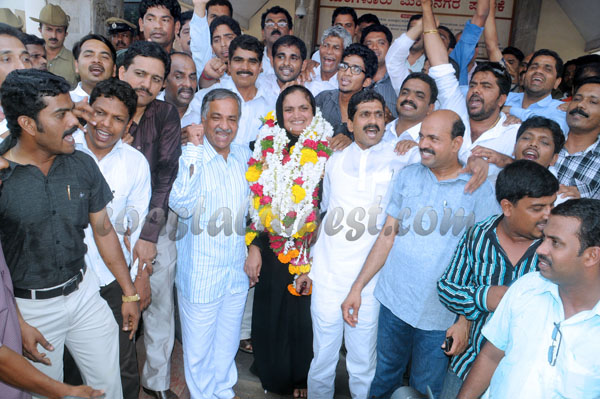
JP Hegde wins Udupi-Chikmagalur Lok Sabha seat
On March 21, Congress candidate Jayaprakash Hegde won the Udupi-Chikmagalur bypoll, defeating BJP candidate Sunil Kumar by about 45,000 votes. The victory came as a blow to the BJP which had made coastal Karnataka its fortress in recent years. Mr. Hegde’s clean reputation along with the dented image of BJP due to porngate episode and corruption allegations against former chief minister B S Yeddyurappa worked in the favour of Congress.
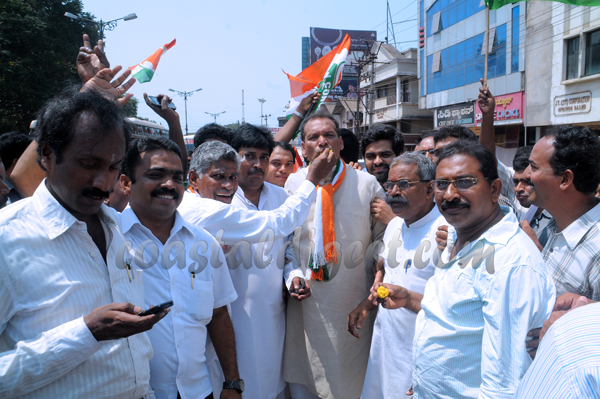
Water scarcity hits Mangalore in summer
As early as March-end, water scarcity hit the city of Mangalore giving multiple headaches to officials in Mangalore City Corporation (MCC). On March 26, Mayor Gulzar Banu inspected the water level at Thumbay dam which had dipped considerably. The level that day stood at 8’-9”ft while about a month ago, it was more than 13 ft on the occasion of Ganga Puja at the dam. The dip in water level was alarming this year as compared to water levels recorded on the same date (March 26) in years 2011, 2010, 2009, 2008 and 2007 which stood at 12’-0”, 11’-8”, 13’-0”, 12’-3”, and 12’-2” respectively. The Mayor ordered stoppage of water supply to industries besides reduction of water supply to Mulki and Ullal. As per concerned authorities of the dam, this was the worst water level dip the dam had seen since May 2003. They also said that in 1988, there was an instance of the entire dam drying up.
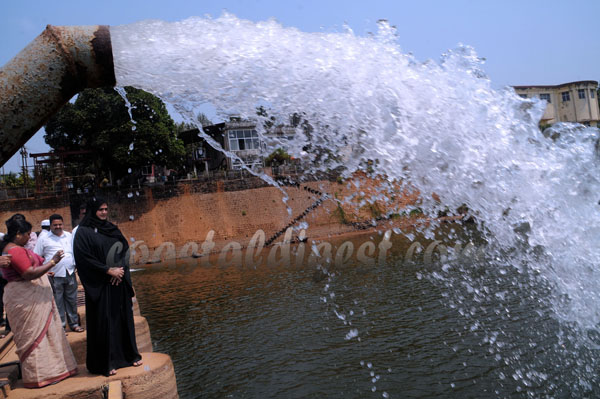
MSEZ’s mud dumping in Phalguni River opposed
The month of May saw residents of Melakoppala and Athrebail stage constant protests against the mud dumping carried out by Mangalore Special Economic Zone Ltd (MSEZL) grousing that the rise in level of the river caused due to mud dumping would cause flooding on their side. Backed by activists Vidya Dinker and others, the residents laid siege to the office of MSEZL besides staging several other protests. The police also detained Ms. Dinker and other villagers in connection with the protests. However, The High Court of Karnataka, in its final order on the PIL filed by the residents of Melakoppala, Athrebailu and Kulur areas along with the Citizens’ Forum for Mangalore Development, directed the company to refrain from carrying out any work not comprehended or permitted by clearances.

Homestay attack rocks Mangalore
On July 28, Mangalore witnessed another infamous ‘attack’ by ‘moral police’ when activists of Hindu JagaranaVedike (HJV) stormed into the Morning Mist homestay in Padil and attacked a group of young boys and girls who were partying at the venue. The incident made headlines at national level bringing back memories of the earlier ‘pub attack’. More than 20 persons were arrested in connection with the attack. The incident also sparked off debate on media responsibility in covering such events. Naveen Soorinje, a TV reporter, was also arrested by the police on similar charges faced by the other goons. He continues to be in jail but there have been demands for his release from all quarters stating that his detention is unjustified.
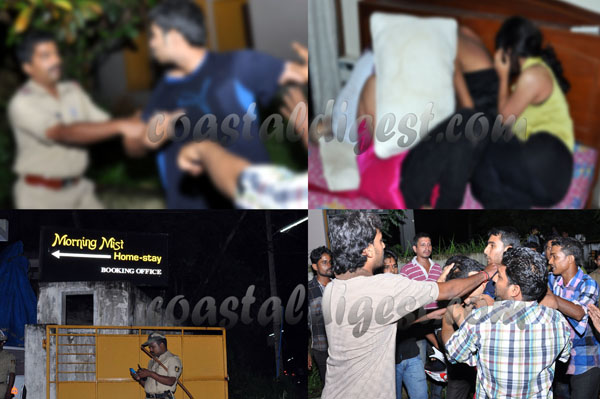
Mangalore International Airport
The international tag given to Mangalore Airport was one of the highlights of 2012. Mangaloreans had a reason to cheer when their airport truly became international, after it was declared ‘international’ by the Union Cabinet in October, six years after it began international operations to West Asia. Around the same time, the much-loved M R Vasudeva retired as the Director of Mangalore International Airport, and J T Radhakrishnan took over as the new Director.
For the first time, the airport in September handled a wide-bodied jet Airbus 310 with 220 Haj-bound pilgrims in it. Now, as another first, Jet Airways will begin operations from Mangalore from January 2013 as the first private airlines to international destinations. Jet is set to commence its daily flight service from Mangalore to Dubai from January 3.

Udupi Diocese comes into being
In October, the new Diocese of Udupi consisting of 48 parishes was formally inaugurated and Dr Jerald Isaac Lobo was installed as the first Bishop of the diocese. Udupi was a part of the Mangalore diocese previously, but became an independent diocese after its establishment. The new Diocese of Udupi consists of 48 parishes in Karkala, Udupi and Kundapur and over 1.25 lakh Catholics.
Sonia visits Mangalore
The year being election year in Karnataka, this visit of AICC Chief Sonia Gandhi to Mangalore on October 18 was of great significance. Ms. Gandhi addressed Congress activists gathered at Nehru Maidan in large numbers and advised Congress leaders to ‘sink their differences’ and reach out to the people in terms of conveying the failures of BJP. She also makes a huge revelation of the state government being given Rs. 80,000 crore by the UPA government asking as to where did the state government spend it.
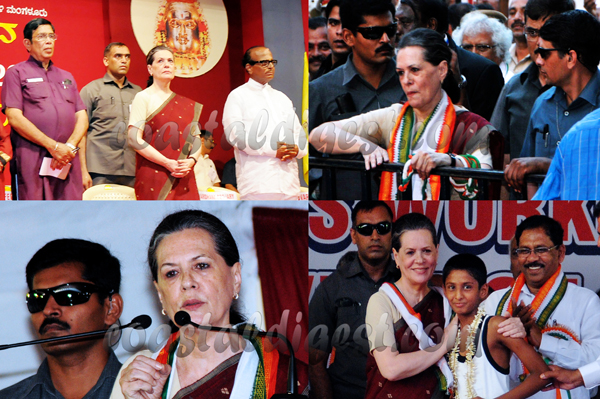
Plastic is banned
The year 2012 will also be remembered as the year in which plastic was banned in Mangalore by the district administration and Mangalore City Corporation. The decision to ban plastic has been met with criticism as the polypropylene bags introduced as a substitute also has elements of plastic in it. People are being troubled by the authorities as there is no proper alternative for plastic especially for carrying meat and fish, it is being said. The MCC has also started door to door garbage collection in some places this year and from January, it is expected to be carried out as a full-fledged operation.

Change of guards
The big one was the change of guard right at the chief ministerial level. Son of DK DV Sadananda Gowda was replaced by Jagadish Shettar as the Chief Minister of Karnataka. Seemanth Kumar Singh was replaced by Manish Kharbikar as the Mangalore Police Commissioner while Abhishek Goyal took charge as the new SP of DK. N Prakash succeeded Dr N S ChannappaGowda as the Deputy Commissioner of the district while C T Ravi was appointed District in-charge minister for Dakshina Kannada after the state cabinet reshuffle, a post which was formerly held by Krishna J Palemar.

Mangalore nurse dies in London
December brought with it, some sad news sailing from London, where a Mangalore-based senior nurse Jacintha Saldanha was found unconscious and later pronounced dead on December 7 after she unwittingly got involved in a prank-call made by Australian radio jockeys to King Edward VII Hospital in central London where she was on duty. Jacintha’s death was treated as a suicide, and after an initial probe, her body was flown in to Mangalore via Mumbai and then taken to Shirva in Udupi district, where it was cremated.
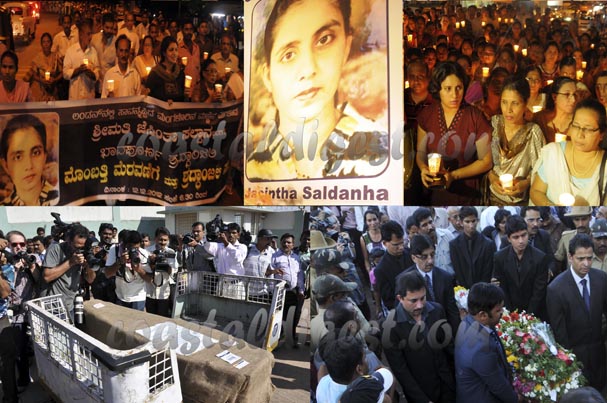





Comments
It is not my first time to pay a quick visit this
web site, i am browsing this web page dailly and take fastidious facts from here
daily.
Add new comment